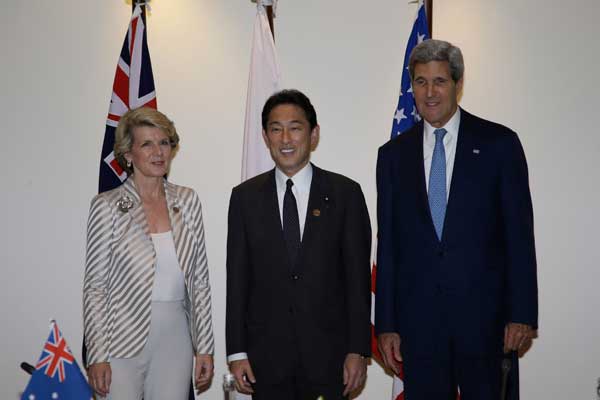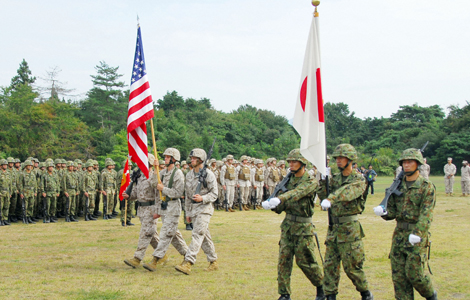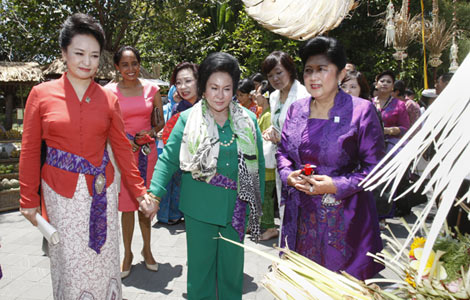Alliances must not threaten regional peace, China says
Updated: 2013-10-08 00:15
By ZHAO YANRONG (China Daily)
|
||||||||
 |
|
Australian Foreign Minister Julie Bishop (left), Japanese Foreign Minister Fumio Kishida (center) and US Secretary of State John Kerry pose for photos at their trilateral meeting ahead of the APEC forum in Bali on Friday.[Dita Alangkara/Reuters ] |
Australian Foreign Minister Julie Bishop, Japanese Foreign Minister Fumio Kishida and US Secretary of State John Kerry raised the maritime disputes during a trilateral strategic dialogue in Bali, Indonesia, on Friday.
A joint statement from the US-Japan-Australia meeting opposed "coercive or unilateral actions" that could change the status quo in the East China Sea and called on claimants to maritime disputes in the South China Sea to refrain from destabilizing actions, according to the US State Department website.
Foreign Ministry spokeswoman Hua Chunying said on Monday that China's principled position on relevant issues is longstanding and clear-cut.
"The alliance between the US, Japan and Australia should not be used as an excuse to interfere in disputes over territorial sovereignty, otherwise it will only complicate the situation and hurt the interests of relevant parties," she said.
"We urge these countries to respect facts, tell right from wrong, be discreet, and refrain from any word or deed that is not conducive to the proper handling of relevant issues and to regional stability," she said in comments on the ministry's website.
Liu Jiangyong, vice-dean of the Institute of Modern International Relations at Tsinghua University, said the joint statement indicated that Japan is seeking more support on the Diaoyu Islands.
"The joint statement has more symbolic meaning than substantive significance. On the Diaoyu Islands issue, Japan has no support from international laws nor historical facts, other than their repeated diplomatic statements, so Japan is eager to get more allies on the Diaoyu Islands issue," Liu said.
The Japan-US alliance is a Cold War relic, and if the alliance is used to deter other sovereign states or to deal with international disputes, the bilateral alliance is likely to develop into multilateral military alliances, Liu added.
Throughout the world, peace and development are the norm, he said. Many disputes, issues and security issues need to be eased and solved through peaceful multilateralism, he added.
"At the same time, we also see another trend in the 21st century that bilateral military alliances turn to multilateral military alliances to take strikes against other sovereign states. Therefore, the trend of the Japan-US alliance into the Japan-US-Australia alliance can be a negative factor for regional stability," Liu said.
According to the US' rebalancing strategy in the Asia-Pacific region, they mean to use the US-Japan alliance to contain China in the East China Sea, and to use the US-Australia alliance to contain China in the South China Sea region, the expert said.
"But unlike Japan, the US has no territorial ambitions in the region, I think. The joint statement is more for their long-term regional strategy," Liu said.
China has never caused any issues against freedom and security of navigation in the South China Sea or East China Sea. On the other hand, Chinese vessels are often blocked by other countries, Liu added.
"The statement itself is untenable. But the trend of bilateral alliances turning into multilateral military alliances is quite dangerous for regional development," he added.
Reuters contributed to the story.
Most Viewed
Editor's Picks

|

|

|

|

|

|
Today's Top News
Back to 1942, entered for the 86th Oscars
Obama says he'll negotiate once 'threats' end
Unprotected sex brings sharp rise in HIV/AIDS
Japan-US military drill raises tension
Xinjiang bid to curb terrorist attacks
No Xmas in July for vendors at Yiwu's market
Yellen to be nominated for Fed chair
Xi calls for more APEC connectivity
US Weekly

|

|













